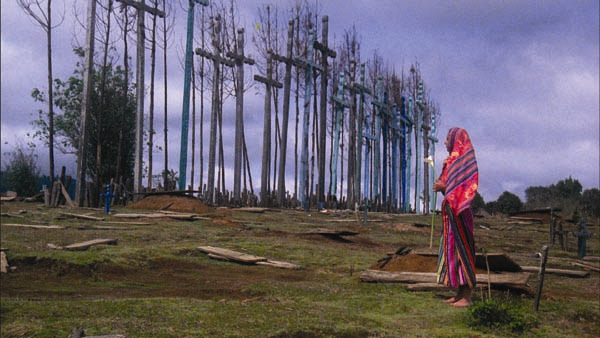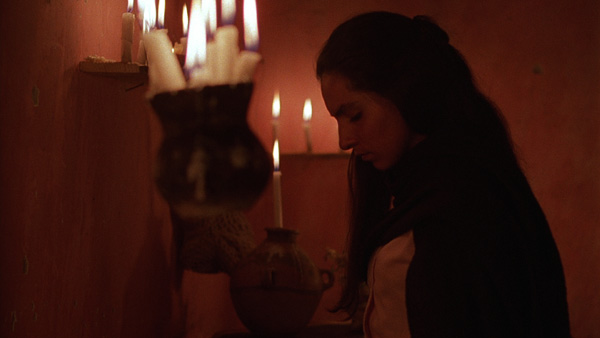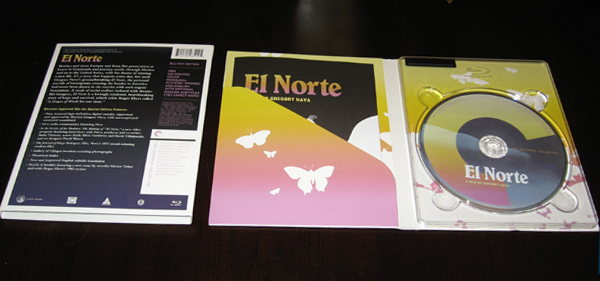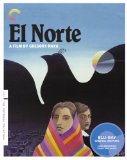| Reviews & Columns |
|
Reviews DVD TV on DVD Blu-ray 4K UHD International DVDs In Theaters Reviews by Studio Video Games Features Collector Series DVDs Easter Egg Database Interviews DVD Talk Radio Feature Articles Columns Anime Talk DVD Savant Horror DVDs The M.O.D. Squad Art House HD Talk Silent DVD
|
DVD Talk Forum |
|
|
| Resources |
|
DVD Price Search Customer Service #'s RCE Info Links |
|
Columns
|
|
|
El Norte - Criterion Collection
The Criterion Collection // Unrated // January 20, 2009
List Price: $39.95 [Buy now and save at Amazon]

Stills in this Review -- Courtesy of the Criterion Collection.
The Film:
El Norte's motives are simple: tell a story of two Guatemalan emigrants as they travel endlessly from their home country to "the north" -- America -- while allowing the tale to hammer out strong undercurrents of hope and, ultimately, disillusionment. But writer/director Gregory Nava knows how to tell this story with passion and beauty; he also tells it in a fashion that speaks to that desire that has led many a Mexican/South American across the border. It's a romanticized portrait of the tumultuous experience, both in its pleasantly photographed high notes and painfully captured lows. But it's impossible to overlook the radiance in the ways that El Norte tells its enlightening, melancholy tale, especially in the ways Nava conceives scene after scene with both visual and contextual significance -- all of which unswervingly tie to its culturally pertinent core.
His and Anna Thomas' story, nominated for an Academy Award for Best Original Screenplay, follows the lives of Mayans Enrique and Rosa, a brother-sister team fleeing their country following a bloody encounter between the Guatemalan army and peasant revolutionaries. To stay in their home village of San Pedro would mean imprisonment and/or death due to their connections with their father, one of these strong-willed peasants fighting for their right to live as more than strong-armed workers slaving away underneath oppression. Instead of hiding and risking the possibility of being captured, Enrique and Rosa elect to follow the dangerous trek north, chronicled in a three-part narrative that covers their shaky endeavors to escape San Pedro, pinpointing their "coyote" (read: cross-border liaison) in Mexico, and finding a way to acclimate to undocumented working life once they've reached "the north".
Films with unflinching, audacious messages are no stranger within the Hollywood shuffle, especially with Iñárritu's Babel and Haggis' Crash receiving stamps of approval from all of the award circuits as of late. El Norte, a film roughly 25 years their senior, exists within the same range as these films, feeding off of one solitary focus -- communicating the harshness that awaits Hispanic immigrants on both sides of their journey -- to paint a long-and winding journey of its focal subjects. Ultimately, Nava's goal is to humanize a larger populace that he shared direct association with by over-humanizing a pair of pristine souls, two starry-eyed innocents who give into life desperate shuffle by taking the longer, harder road to survival. Nava does so by crafting El Norte into a resonant and sweeping pedestrian epic, one that tastefully swirls together culture, photography, and civil critique into a haunting portrait of an enduring issue.
It's a film of layers, a fact that's obvious from the moment we first see Enrique and Rosa at their family's dinner table; along its intrepid surface, El Norte concentrates on the big picture involving the desperate and weighted nature of fleeing one's home country for survival's sake. Underneath, we witness a nuanced transformation within the film's two main characters, slowly weathering their wide-eyed and hopeful personas by dragging them through both double-sided kindness and holistic maliciousness. The obvious sucker punch lies in the misrepresentation of "the north", painting it as paradise at the end of a grimy crawl through countless tribulations. Instead, heartbreak replaces salvation -- both in their eyes and in ours -- as we see the same kind of strong-armed subjugation from American sources that we see imposed onto the beautifully archaic San Pedro way of life. It's a blunt way of communicating both messages, but sometimes filmmakers require such frankness to spread their message out to a larger audience.

Zaide Silvia Gutiérrez as Rosa Xuncax
To make the boldness of El Norte's communication a pleasant experience, Gregory Nava placed his faith in cinematographer James Glennon (Election, TV's "Carnivale" and "Deadwood") to capture both the natural and artificial beauty present in its escalating environments. Their combined visual style, which primarily utilized found objects and locations instead of pre-fabricated ones, captures Enrique and Rosa's world in an artful, gorgeous light. Using Chiapas, a location along the Southern-most Mexican border next to the Mayan mountains, they captured as authentic of an environment as they possibly could without stepping into a civil warzone. The authenticity speaks for itself, as the film's initial environment becomes a memory worth remembering both for Enrique and Rosa as well as the audience.
These images from the film's first act, most of which encompass Rosa as she interacts with Nava's brilliant Mayan imagery, also become an emotional center that the audience latches onto throughout the rest of their journey. Pastels and tangible neon shades saturate the first act, highly prevalent in the Guatemalan-imported articles of clothing, while the utopian environments and brash, falsely-rendered blasts of color clash with dilapidation in the young Mayan's environment -- shades, like bold pinks, that seem familiar. Both color and lighting become stunning communication devices of their own, lacing Nava's film with emphatic tones that range from reflection and happiness to sorrow and despair. A scene in which Rosa steps into a neon-pink drenched apartment building utilizes familiar colors that we've grown accustomed to, but in a blatant and unnerving fashion that cloaks her with discomfort instead of real splendor.
El Norte wouldn't work without Zaide Silvia Gutiérrez and David Villalpando as Rosa and Enrique Xuncax respectfully, who were freshmen actors at the time of filming. There's an honesty conveyed through their portrayals, along with a huge host of the inexperienced extras pulled in from neighboring cities around the neo-Mayan shooting locations, which invoke the sense of unsullied and natural gravity that Nava wanted to portray. Naïve strength is the boldest and most obvious attribute that they needed to convey, and they do so with Gutiérrez coming to the forefront. Nava obviously wants to make his film one with two protagonists, which reflects the intensely impressive ways that the two actors play off of each other. In short, both Gutiérrez and and Villapando are excellent in portraying exactly what they need to portray in their respective roles -- unswerving constitution, ugly shadows, and all. Thankfully, he stuck with native actors speaking their native tongue for the forefront performances, as many of his English-speaking segments fall a bit flat.
Enrique and Rosa's connection, their drive to reach their destination together by any means necessary, breathes massive life into El Norte amid a sea of supportive characters that both help and hinder their resolve -- along with their shifting dispositions. It's heartbreaking, at times bittersweet, and ultimately highly-rewarding as it transforms into a tearjerker of a cultural drama. But Nava's picture isn't without speckles of humor, nor without a strong sense of beauty as he hammer his messages home through a collage of real-life anecdotes and Mayan poeticism. And, amid bluntness and strong-armed elements that solicit forceful message communication, he's created a surprisingly complete picture with El Norte: one that, even after it portrays the immigration narrative, still encourages a sense of hope and learning outside of its seemingly unidirectional momentum.
The Blu-ray:

Criterion's Blu-ray presentation of El Norte comes in a slim-line digipack casing, encompassed by a soft cardboard slipcover that replicates the front artwork and Chapter Listing on the back. Inside, it's a splendidly designed set: adorned with white butterflies, an element used in the film, the inner artwork opens to reveal an array of pastels that mirror the Mayan colors from the beginning of the film.
Included is a booklet that contains a cast and credit list, as well as two authored pieces: one, entitled "Promised Land" by Hector Tobar, and Roger Ebert's 1983 review of the film. Information about the restoration and mastering can be found in the last pages of the matte insert. For reference, this is Criterion Spine #458, a denotation that carries over the same to the Blu-ray release.
Video and Audio:
As with Criterion's spectacular effort with Chungking Express, El Norte thoroughly impresses with its high-definition presentation of a less-than-cooperative print. Lots of natural film grain and reel flickers drape Nava's approved 1.78:1 widescreen negative, presented here in a richly fluid 1080p AVC encode "created on a Spirit 4 Datacine from a 35mm interpositive and the original camera negative" as per Criterion. If you're looking for a glitzy, glamorous transfer to display the prowess of Blu-ray technology, El Norte's not the prime candidate; however, if you're aiming to watch and screen this essential film in the absolute best fashion that current technology can muster, then opting for Criterion's high-definition disc offers a wealth of healthy and dazzling visual moments. Nearly damage-free, handsomely saturated with natural color shades, and free of both edge enhancement and other sloppy clean-up efforts like noise reduction to "polish" the image, El Norte looks astounding.
Within the first few minutes of the film, there's a lot of dark and heavily contrast scenes that barely echo the transfer's strength. Profound detail can be seen along berry bushes, against the guard's clothing, and upon the tethered shoes of the berry pickers, but nothing that'll really amaze -- until we see Rosa for the first time. As soon as the she and two other Mayan women appear on-screen with their colorful outfits, then the disc shows off exactly what it can do. The natural interior shots within the Xuncax family home display apt shading and palette utilization. Distinguishing color levels and proper saturation become big assets to this disc, as they explore a wealth of shades in both the earthy Guatemalan locations and the artificial American atmospheres. Textures, even through the grain, have moments that truly stand out, such as the granules of wear and tear against a handheld drum during the funeral service and against the brightly-lit full moon during another. Then there's the nature cinematography which, from the images of a goat in the woods to the scurrying of tunnel rats, is outstandingly detailed.
To accompany this clear and impressive image, a sharp monaural Mayan/Spanish/English uncompressed track has been included. Along the same lines as the visual treatment, El Norte sounds extremely good from its 35mm magnetic source. One element that stands out without relent is the inspiring musical track, heavy with pipes and chimes that reflect the ancestral Mayan roots. It adds to the atmosphere, but it also helps to bolster the fantasy-inspired moments as Enrique and Rosa's past comes to visit them. Every ounce of the music is crystal clean and beautiful, but it never drowns out the dialogue to any degree. From the naturally-recorded tracks to the light amounts of re-recording, verbal clarity is top-shelf here. Even the sound effects present in the film -- like the light scatterings of gunshots at the beginning of the film to the chirping of birds and screeching of rats -- were all handled appropriately without trying to make more out of them than they could.
Along with Criterion's call-to-fame in the visual/audio departments, their subtitle treatment also supports the film splendidly. Presented in crisp, clean, and unobtrusive white text, the English language option always stays on-screen for apt amounts of time that allow for proper textual processing. English, both SDH and regular, is the only language option.
Special Features:
Commentary from Director Gregory Nava:
Professional, eloquent, and insightful, Nava's commentary makes certain to shed light on many of the items that might spark some thought and a draw artistic eyes. He concentrates on Mayan imagery and melding to their culture, as well as accentuating the potency of their performances. Nava even crafts a bit of a white lie to get more potent performances from his two key performers, a mechanism that really played to his advantage during their powerful scene occurring before they begin their journey. He was obviously well-researched and intensive with his symbolic points, but it all comes together into a beautiful film -- points that only grow more significant through his graceful elaboration.
Making of El Norte (58:20, HD):
Watching a Criterion-produced assembly piece always provides a much more sober experience compared to others of its ilk. Though the contents are similar -- interview time with the director/crew/actors mixed with behind-the-scenes and in-movie stills -- the editing and rhythm is much more subtle and encouraging for further watching. Gregory Nava and Anna Thomas elaborate more on the casting, shooting decisions involving Chiapas, the small size of their filming crew, as well as aggression against their crew. It also seeps into the information revolving around shooting into the United States, as well as post-production and reception for the film and its actors as it screened at the Telluride Film Festival. Each of these points that I've mentioned are marked by chapter points, which are nicely spaced and expressive without overstaying their welcome -- the recipe for a perfect supplemental feature. Furthermore, a selectable Index has been made available as well.
The Journal of Diego Rodriguez Silva (30:06, SD):
As an addendum, Nava's short film from college has also been included. It's a black and white feature that is based on Silva's civil war documentary. It's a brooding, attractively shot feature that showcases Nava's talent with facial mannerisms and simple, intense moments. Though there's some damage here and there in the print, it looks and sounds just fine for an aging student film.
Also available is a photo gallery entitled Scouting in Chiapas that contains 25 or so shots taken during the crew's scouting mission in Chiapas, as well as a full-frame Artisan Trailer for the film.
Final Thoughts:
El Norte has a primary objective within its sight as soon as the film begins: to guide the viewer through an embellished journey to America in the shoes of two Guatemalan emigrants. Underneath that forceful film lies a graceful tale of unwavering faith and heartbreaking disillusionment, all along with superb cinematography and strong performances from its lead actors. It's by no means a faultless work of art, but Nava's Oscar-nominated picture has more than enough heart behind its conception to mask a few mistakes.
Criterion's Blu-ray package hits all the right notes -- beautifully presented high-defintiion transfer, splendid sounding audio track, as well as a strong number of heavily-concentrated extras -- making this one of those all-encompassing experiences with El Norte one that'll impact with its content and enchant with its digital properties. It's a Highly Recommended presentation for a film that has limited return value, though the visual design and strong lead performances do make their tumultuous trek worth another go.
|
| Popular Reviews |
| Sponsored Links |
|
|
| Sponsored Links |
|
|
| Release List | Reviews | Shop | Newsletter | Forum | DVD Giveaways | Blu-Ray | Advertise |
|
Copyright 2024 DVDTalk.com All Rights Reserved. Legal Info, Privacy Policy, Terms of Use,
Manage Preferences,
Your Privacy Choices | |||||||













